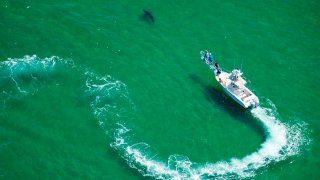
Enough white sharks are now visiting Cape Cod that researchers are calling it one of the world's largest hot spots for the apex predator.
About 800 white sharks swam through the Cape Cod area from 2015 to 2018, according to the new research, published Thursday in the journal Marine Ecology Progress Series. It used a first-of-its-kind population survey for white sharks, known to the general public as great white sharks, in the North Atlantic Ocean.
The researchers' "estimates suggest that the Cape is among the larger white shark hotspots worldwide," the study's lead author, the Atlantic White Shark Conservancy's Megan Winton, said in a statement, adding that it's "good news from a conservation standpoint."
The University of Massachusetts Dartmouth's School for Marine Science and Technology and the Massachusetts Division of Marine Fisheries also collaborated on the study, in which researchers reviewed nearly 3,000 videos from 137 trips, identifying 393 different sharks. That data was analyzed through statistical modeling to produce the 800 individual statistic.
Greg Skomal, the head of the state's shark research program, cautioned that there aren't 800 white sharks off the coast of Massachusetts at any one time — they can stay anywhere from a few hours to weeks as they hunt seals. He told NBC10 Boston that the research is important because it puts a number on the population of white sharks off Cape Cod for the first time.
Get Tri-state area news delivered to your inbox. Sign up for NBC New York's News Headlines newsletter.
"It's only a small segment of the population but previously we knew nothing about numbers of white sharks here in this part of the world," Skomal said.
The news of white sharks off the coast won't be a surprise to many beachgoers on the Cape, where swimmers are frequently cleared out of the water for shark sightings. The study found that the number of sharks visiting the Cape's waters did increase between 2015 and 2018.
Asked if it's possible the population size has increased then, Skomal said it's possible, but that the growth will likely level off, if it hasn't already.
"At some point we believe the population is likely stabilizing at a pretty consistent number, just given the fact that you're dealing with a limited area that has a limited carrying capacity," he said.
Skomal echoed Winton in calling the announcement good news from an ecological standpoint — "we've got sharks responding to the presence of seals, doing their job feeding in these areas, it points to the restoration of an ecosystem and I think that is good news" — but he did share his advice for beach managers and swimmers: to keep from going out to 5 or 6 feet of water, where white sharks can swim, as another recent study showed.
"If a white shark has 5, 6 feet of water, it can come in," he said.

